- Home
- Karen Marie Moning
The Immortal Highlander Page 17
The Immortal Highlander Read online
Page 17
Inverness.
Morganna.
It was near here that she’d lived so long ago, at Castle Brodie.
And suddenly, in that side-view mirror there were no roads, no hotels or shops, no diners or pubs, nothing but wide-open, unspoiled land stretching beneath a vast blue sky . . .
I love you, he’d told her, astonished himself when the words had fallen from his tongue. But Circenn had just been born and was wrapped in blankets, cradled in her arms—his son. She’d been sweat-glistening, damp-haired, exhausted, and glowing with an innately female radiance. And something had come over him. He’d said it, and it had been too late to recant. And, bloody hell, how swiftly he’d wished to recant.
She’d torn her gaze reluctantly from the bairn and tipped her face up.
And she’d laughed.
If he’d had a soul, it would have sliced right through it.
Her laughter had been soft and wry, and all the more abrasive for it. For in it, there’d been a touch of pity.
Ye canna love, Fae. Ye have no soul.
So much for Adam Black’s words. Had any woman ever believed them? Or merely bowed to his irresistible sensual lure, fallen prey in body but never in heart? Once, he’d not cared. But time and contact with humans had done strange things to him, changed him, made him begin to wonder about things he’d never wondered about before—and sometimes he felt like he imagined Gabrielle must: straddling two worlds, one foot here, one foot there, no place that felt like home.
How do you know I can’t love? he’d hissed. So casually she’d thrown the words back in his face, words he’d never said before. Words he’d never said again. Define love, Morganna.
She’d been silent for a time, staring down at the tiny infant snuffling wetly in her arms.
Love means ye’d die for that person a thousand times o’er, she’d finally said, gazing down at the newborn. Ye’d give the verra last drop of all ye had to give to tarry at their side but one moment more, to behold them alive and hale and happy.
That’s not fair, he’d countered. You know I don’t have a soul. If I die, I cease to exist forever. If you die, you go on. To some other time, some other place, some other world. I become dust. Nothing more. You can’t hold me to the same criteria.
Ye wish to play at being like us but nae held to the same accounts? If ye truly love someone, Fae princeling, ye’d give the verra last drop of all ye had to give—whate’er it may be. And ye’d nae squabble o’er differences.
Maybe it’s you who can’t love, Morganna. Maybe when you love someone it means you’d be willing—not to die—but to give up your immortal soul for them. So maybe it’s your failing, not mine.
And so the argument had begun. The timeless, eternal, never-changing argument between them. Until the unique Tuatha Dé bond forged between a Fae male and human woman the instant a child was conceived had become more painful than pleasing. Until they’d both built walls to keep the other out.
By Danu, how many times had they had that fight? A hundred? A thousand?
Right up to the day she died. And he’d stood over her deathbed, trying to get her to take the damned elixir of life, as he’d been trying to get her to since she’d been seventeen; but like a fool, in a rare moment of abjectly stupid honesty all those years ago, he’d told the young Morganna of its unsavory side effect: that immortality and immortal souls could not coexist.
That once she took it, in a short number of years all trace of that by which she defined her humanity would be gone. That soft golden glow surrounding her would fade day by day, until nothing of it was left. Until she was as void of that divine inner flame as any Fae.
She would change, they always did.
But better a soulless Morganna than a dead one.
Never, Adam. Let me die.
He could have taken away her memory of his admission. He could have forced her to take the elixir. He could have made her believe anything he’d wanted her to believe.
But what he’d wanted her to believe was that he was worth it.
Would it be so bloody bad to be like me? he’d thundered. Am I such a foul being, then, without a soul, Morganna? Have I not been good to you? What is it you want from me I’ve not given you? What have I failed to do, be?
“Adam, there’s something I don’t get. Why didn’t Darroc just kill us?” Gabby asked abruptly, jarring him from his dark reverie. “He had the advantage of surprise. He could have shot you in the back, or hit you over the head or something.”
He blinked, rubbing a hand over his eyes. Christ, those memories had come suddenly and without warning, crashing over him so intensely that he’d forgotten where he was for a few moments. He’d been back there, hating her for dying. Hating her for looking down on him until the very end for lacking that with which she’d had the grace to be born.
Hating all humans, with their holier-than-thou souls, lumping all mortals together as one unilaterally vile species. And finally remembering that he was, after all, a demigod—so fuck them!—he had walked through the Highlands for a time as Death himself.
Jaw clenched, he shoved the whispers of times-gone-by back into that dark corner of his mind he never willingly visited. His oubliette, his place of forgetting. Layers upon layers of memories dropped into the pit and left there, stretching back thousands of years. To immerse in it would be to invite madness. Yet another lie he’d told Circenn was that learning too much too quickly caused madness among their kind, when the truth had been a subtle variation of that: It was not knowing when to forget that did.
“You don’t know Darroc, ka-lyrra,” he said. “He likes to play with his prey before he kills it. He wouldn’t take the risk while I was touching you because, if he didn’t knock me out or kill me instantly, I could sift us to safety. He didn’t bother to conceal himself and the Hunters this time with the féth fiada, because he wanted me to see him and hear him. He was trying to antagonize me, to get me to turn on him, to separate us. After what he saw, I’d wager he now wants you as much as he wants me.”
“Why?”
He glanced at her. She’d twisted her long hair up in one of those clips that she was so fond of, and there was a little spiky tail sticking straight up, poking the roof of the car, bobbing perkily as they bounced and careened over the rough road. She had on her soft suede jacket with the fleecy lining, the collar turned up, framing her slender neck. The early-evening sun was a fiery ball sliding down behind Ben Killan, gilding her dainty profile as she nibbled her lower lip.
And she was the bonniest damn thing in all the Highlands, far more than the blooming bens and sparkling burns.
She was funny and stubborn and sexy and smart and packed with human passion, and she did something to him he couldn’t explain. Kissing Gabrielle, he’d decided back in the suite, with his arms full of her lush softness, was as close to tasting heaven as a man without a soul could hope to get. She’d responded to him with all the explosive passion he’d sensed in her the moment he’d laid eyes on her, rising swiftly to the edge of climax. He could so easily have brought her to it after they’d been interrupted, could have been merciful and relieved the tension in her body while they’d sifted, or even later on the train or plane.
But he’d not been about to let her off so lightly. He liked the thought of her stirred to painful awareness of him. Hurting with it, just like he was, constantly, painfully aware of her. They would suffer together. When he finally gave her that first orgasm, it would be followed by a dozen more. By his cock in her, deep to the hilt. Branding her his own.
His human body, it seemed, had pulled a MacKeltar trick; it had looked at her and growled: mine. And there was no going back. For either of them. If she hadn’t figured that out yet, she would soon.
“To get to me. He’s a twisted bastard. He likes to take from me. Especially mortal women. I had to play a deep game to keep him from finding out about Morganna. But he knows about you now, and he’s not going to stop coming.”
She opened her mouth, then
closed it again. Then opened it, “Would it get to you, if he took me?”
He glanced at her, but she wouldn’t look his way. There’d been a strained note in her voice. For a novel change, her gaze was fixed firmly on the road ahead. The question was important to her. And to him. “Yes, Gabrielle,” he said with quiet intensity. “It would.”
“Oh.” She was silent a long moment. Then, “Are you sure we’ll really be safe at this place we’re going to?”
He smiled faintly. She was as bad as he was when it came to skirting issues and changing subjects. No matter. There was time. He would see to it that there was more than enough time.
“We already are; we’ve passed the wards. The queen is alerted the moment a Tuatha Dé crosses her wards and comes within a thousand leagues of Keltar land, and those wards identify the trespasser. This is the one place Darroc can’t come without revealing himself to Aoibheal. If he did, the game would be over, and he’s not about to let that happen. Besides, he has little familiarity with the human realm, and if I know Darroc, he’ll focus on what must have brought him to Cincinnati. He’ll keep trying to find Circenn.”
“Will the queen know that you’ve crossed her wards?”
“The wards were designed for a Tuatha Dé, which I am no longer, so I don’t think so.”
“You didn’t think Darroc would find us so quickly.”
It wasn’t a question, but he answered it anyway. “I underestimated him; I didn’t think he’d dare bring forth more Hunters. There’s no way he could have found us so quickly with only the four Hunters you saw with him in Cincinnati. But he summoned more.”
“How many more?” she said, glancing at him, eyes widening with alarm.
“You don’t want to know.” When he’d turned her in his arms to face him, he’d been looking over her shoulder. A full score of Hunters had materialized right behind her, just waiting for the moment he would turn to Darroc and stop touching her. Crammed wing to dark wing, looming over her. He’d never seen so many Hunters together in one place, outside of their Unseelie prison. Even he’d found that dark legion mildly disconcerting.
More than disconcerting. The mere thought that they might get their claws on Gabrielle had done something to the human heart inside his chest, had made it feel as if it were . . . seizing up, being squeezed in a giant, crushing fist.
“Were they behind me?” she asked warily.
She didn’t miss a thing. He nodded.
“Uh . . . more than . . . er, a dozen?”
“Yes.”
“You’re right,” she said hastily. “I don’t want to know.” Another lengthy pause. “You know . . . um, what Darroc said about you and him playing with mortals . . .”
A muscle leapt in his jaw. “What about it, Gabrielle?”
“Was it, er . . . true?”
“No,” Adam said. “Darroc lies. He was just trying to fill your head with nonsense. Cause dissension between us, do the old divide-and-conquer thing.”
“Really?” She looked at him, green-gold eyes wide, searching.
“No,” Adam said. “Really.” He met her gaze levelly, willing her to believe him, hating that the one time she was looking as though she might, he was lying. But who and what he’d once been was not who and what he was now, and he’d not be tried and convicted for ancient crimes.
She nodded slowly, then, “So,” she changed the subject briskly, “are you sure that these MacKeltars we’re going to see will believe me? Even though they won’t be able to see you?”
“Ah, ka-lyrra, I’m not sure there’s anything the MacKeltar wouldn’t believe. They’ve pretty much seen it all.”
“We’ve lost him, Darroc,” said Bastion.
Darroc stared at the Hunter in icy silence. Watching Adam with his little human had reminded him of the times long ago when they’d ridden the Wild Hunt together, when they’d hunted like brother-gods, invincible and free, ruled by nothing and no one. They’d been inseparable, known each other’s thoughts as well as their own. Mortals had been nothing more to them than lowly beasts, good for a chase, amusing to play with, to set upon each other and watch them enact their silly tragedies.
But Adam had changed. He’d been corrupted by contact with humans. And he’d turned on his own kind over one of them. On him, Darroc, who’d once favored Adam as he’d favored no other.
Adam had become protective of humans, spending most of his time among the short-lived creatures. It was inconceivable to Darroc that any sentient entity could prefer humans to the Tuatha Dé.
He’d waited for Adam to return to the fold, to indulge and get over his perverse fascination. But millennia had passed and Darroc had come to see Adam for the abomination he was.
Incensed to discover Adam dallying passionately with the human, he’d let himself and his Hunters be seen. He’d wanted his scarred face to be the last thing Adam saw as he lay dying, as he watched Darroc break his woman.
But Adam hadn’t responded to his taunts in his usual way. No, he’d reacted as if Darroc didn’t even matter, as if his taunts couldn’t touch him, as if only the safety of his pathetic little mortal was of any concern.
For the second time in as many days, Adam had used his body to shield his human and sifted out before Darroc could stop him.
And now the sin siriche du (who was no longer worthy of such a noble appellation) was out there somewhere with full knowledge that Darroc had loosed the Hunters. And Darroc knew Adam knew exactly what that meant: that he was planning to challenge the queen.
Which meant he had to find Adam again and fast. Before the clever D’Jai prince devised some way to get Aoibheal’s attention, even powerless as he was. Darroc could no longer afford the luxury of drawing out his death. When next he saw Adam Black, his demise would have to be swift. He couldn’t let his thirst for revenge jeopardize his ultimate goal.
Still . . . he might keep the woman for a time. She liked Fae males? He’d show her what Fae males could do to human women. He’d show her what Adam really was somewhere deep inside though he tried to deny it. Tuatha Dé: a god. And she would worship before she died.
“Don’t look at me like that, Darroc,” the Hunter growled, jarring him from his thoughts. “We were ready. We could have slain them in a human heartbeat. You insisted on separating them and taking them alive. Is this about regaining our freedom, or your vengeance?”
“Both,” said Darroc flatly. “And it’s none of your concern. Tell me, where did you last have their scent?”
“At a human airport.”
“Their destination?”
The Hunter shifted leathery wings. “There were too many humans about. Their scent had been scattered by the scent of too many others by the time we arrived. We were unable to determine it.”
Darroc cursed viciously.
“Let me call forth more Hunters. We’ll find them again,” said Bastion.
“The Unseelie King would note their absence,” said Darroc. “He’s no fool.”
“But he is currently seeking his amusement elsewhere. None have seen him for quite some time,” replied Bastion.
Darroc pondered the bit of information.
If only the Unseelie King could be relied upon, could be sought for counsel or alliance, but the King of Darkness was like no other of their race, so ancient that Aoibheal, at just under sixty thousand, may as well have just drawn her first breath. It was rumored that the Unseelie King counted his existence by many hundreds of thousands of years; some whispered it to be even more. And was, more often than not, quite mad. Few ever so much as glimpsed him, and none knew his name or true form. He’d created his own realm within the shadow-realm of the Unseelie prison, a fortress that was said to house entire galaxies; a dark, vast dominion sown with traps for the unwary, into which none that he knew of had ever entered uninvited and returned.
For that matter, none had ever entered invited and returned, save the Seelie queen on two occasions. Even she gave the King of Darkness wide berth.
Still . .
. if he was occupied elsewhere, Darroc could certainly use more Hunters. “How long since last the king was seen?”
“Two score and ten,” said Bastion.
A tidy bit of time, a risk worth taking. “Another score of you, no more,” Darroc conceded. “Find Adam’s son. I believe he will try to use him to get word to the queen. We must prevent that from happening. Saturate both Cincinnati and the Highlands. When you locate his half-blood bastard, summon me. And if you happen to find Adam, do not approach. I want to be there when he dies.”
Bastion nodded, sharp teeth gleaming.
17
Drustan MacKeltar tossed back a swallow of scotch and glanced around the table with a satisfied smile.
In the past year the MacKeltars had pretty much seen it all.
And, God willing, we’ve seen the last of it, he thought fervently.
After so many calamitous events, life was peaceful and sweet, all he’d ever dreamed and more. He wanted naught more than to immerse himself in simple pleasures for the rest of it. Like a meal shared with those he loved, before a crackling peat fire laid with sheaves of fragrant heather.
His gaze skimmed his dining companions: There was Gwen, his beloved wife, brilliant physicist, and radiant mother of their precious two-month-old twins, prattling happily away to Chloe about—of all things—the schools their children might one day attend.
And there was Chloe, his brother’s cherished wife, an antiquities expert and bookish scholar. They’d just learned last week that she would soon be adding to the MacKeltar clan, and she’d been glowing ever since, as had her husband, Dageus.
Ah, and there was Dageus, his twin, younger by three minutes, and best friend.
It had been months since that night in The Belthew Building, when Dageus had battled and defeated the modern-day sect of the Draghar, who’d been determined to resurrect their ancient namesake. Dageus’s eyes were once again sunny and clear, and he was full of easy laughter. Drustan couldn’t recall ever seeing him happier.
Initially, Dageus had spoken of building his own castle on the northern third of the MacKeltar estate, but Drustan had swiftly put an end to such foolish talk.

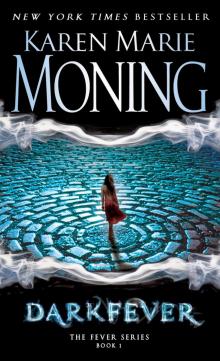 Darkfever
Darkfever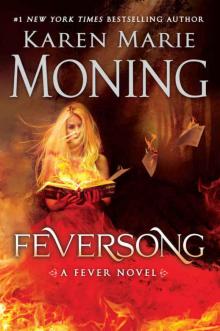 Feversong
Feversong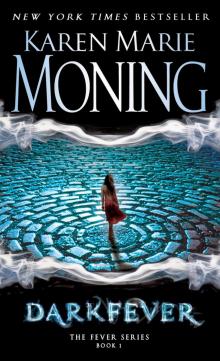 Faefever
Faefever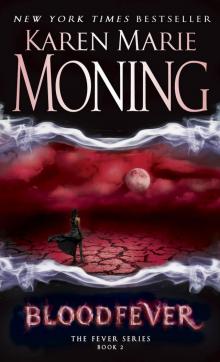 Bloodfever
Bloodfever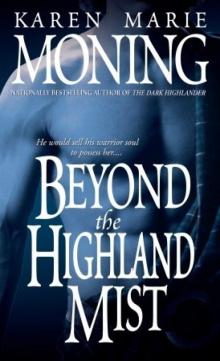 Beyond the Highland Mist
Beyond the Highland Mist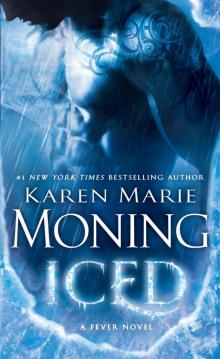 Iced
Iced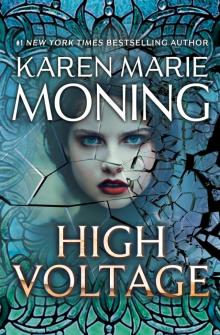 High Voltage
High Voltage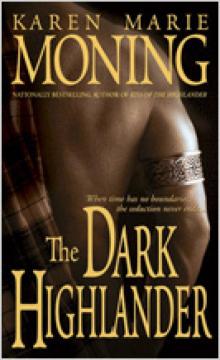 The Dark Highlander
The Dark Highlander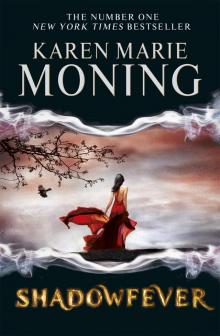 Shadowfever
Shadowfever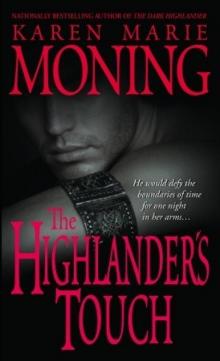 The Highlander's Touch
The Highlander's Touch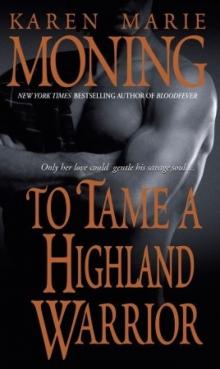 To Tame a Highland Warrior
To Tame a Highland Warrior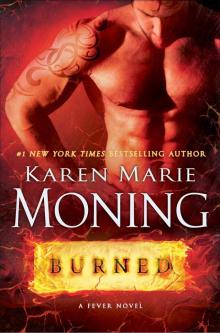 Burned
Burned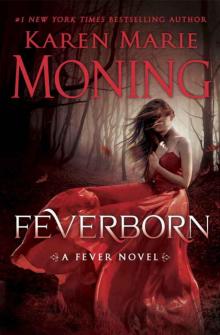 Feverborn
Feverborn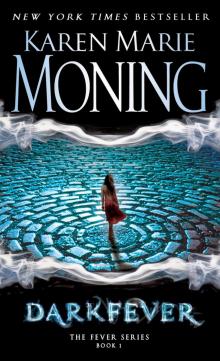 Dreamfever
Dreamfever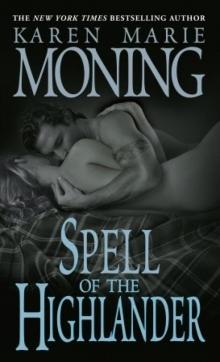 Spell of the Highlander
Spell of the Highlander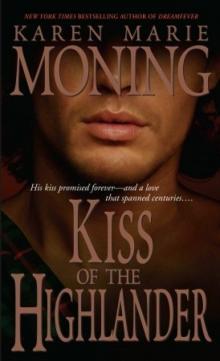 Kiss of the Highlander
Kiss of the Highlander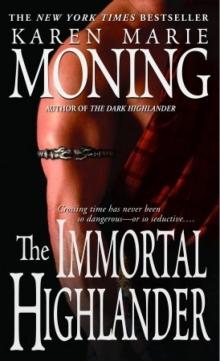 The Immortal Highlander
The Immortal Highlander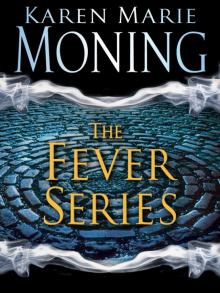 Karen Marie Moning’s Fever Series 5-Book Bundle: Darkfever, Bloodfever, Faefever, Dreamfever, Shadowfever
Karen Marie Moning’s Fever Series 5-Book Bundle: Darkfever, Bloodfever, Faefever, Dreamfever, Shadowfever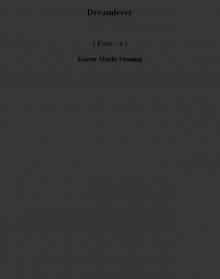 Dreamfever f-4
Dreamfever f-4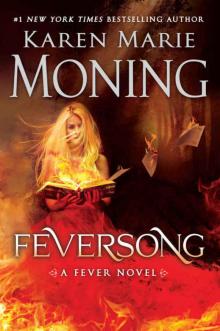 Feversong: A Fever Novel
Feversong: A Fever Novel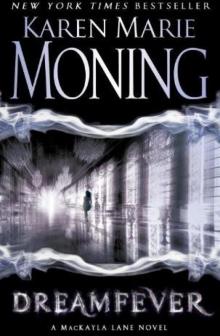 Dreamfever_The Fever Series
Dreamfever_The Fever Series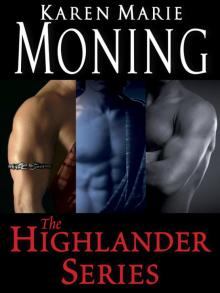 The Highlander Series 7-Book Bundle
The Highlander Series 7-Book Bundle![[Highlander 04] - Kiss of the Highlander Read online](http://i1.bookreadfree.com/i1/03/29/highlander_04_-_kiss_of_the_highlander_preview.jpg) [Highlander 04] - Kiss of the Highlander
[Highlander 04] - Kiss of the Highlander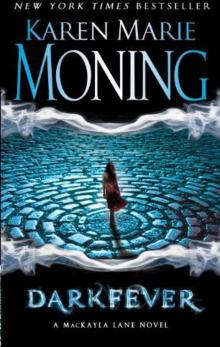 Darkfever_The Fever Series
Darkfever_The Fever Series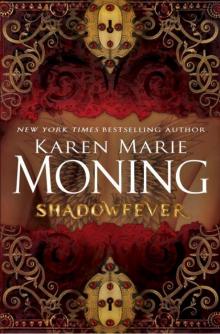 Shadowfever_Fever
Shadowfever_Fever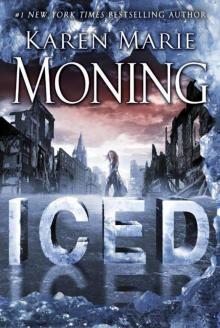 Iced: A Dani O'Malley Novel (Fever Series)
Iced: A Dani O'Malley Novel (Fever Series)![Fever [08] Feverborn Read online](http://i1.bookreadfree.com/i2/04/09/fever_08_feverborn_preview.jpg) Fever [08] Feverborn
Fever [08] Feverborn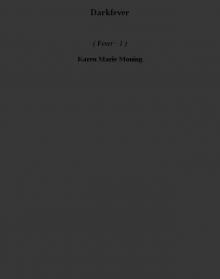 Darkfever f-1
Darkfever f-1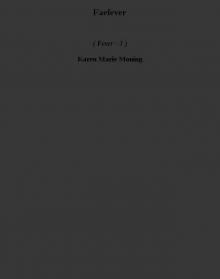 Faefever f-3
Faefever f-3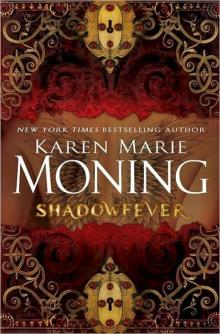 Shadowfever f-5
Shadowfever f-5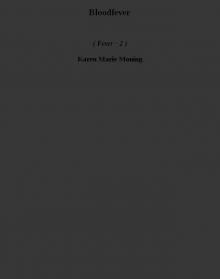 Bloodfever f-2
Bloodfever f-2